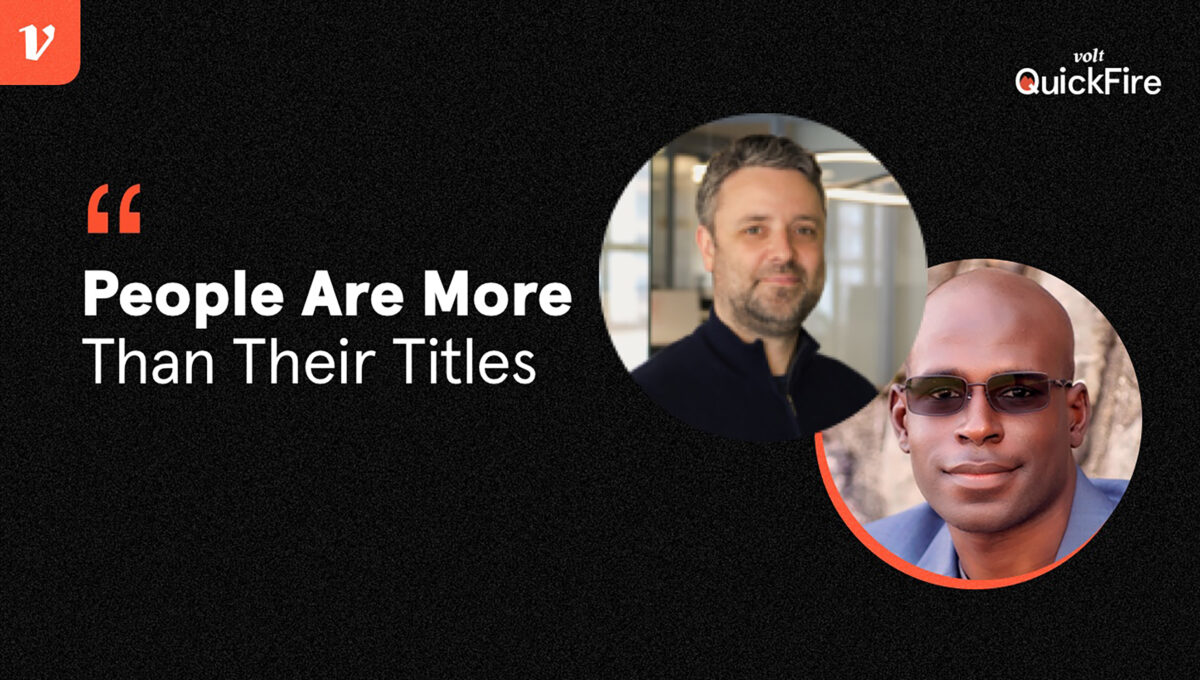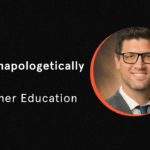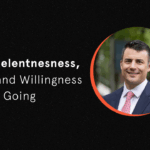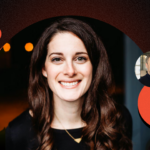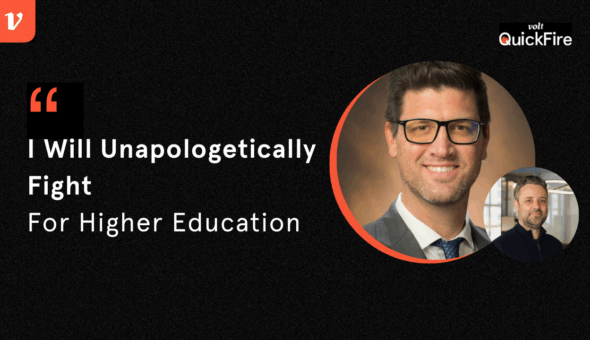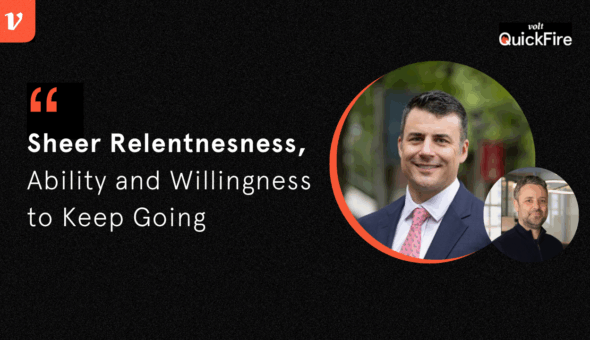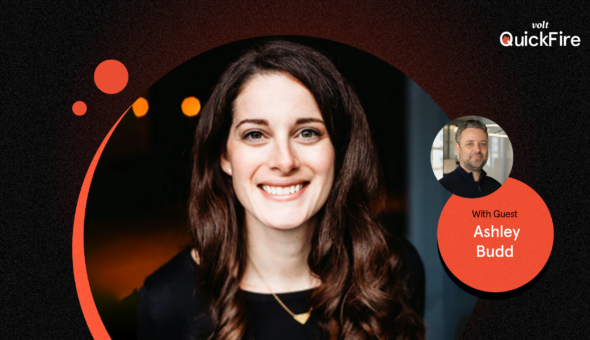Volt Publisher Kevin Renton sat down with Joshua Charles, director of web strategy and technology at Rutgers Business School. Joshua shares his passion for higher education and his desire to give back to the community by helping others advance in their careers, including his involvement with HighEDWeb. He also discusses the future of higher education, mentioning the need for adaptation and the potential for different modes of learning and the challenges of staff shortages and leadership gaps
Rutgers Business School in New Jersey offers diverse business programs, allowing students to tailor their education to their career interests. With a strong focus on research and innovation, the school prepares graduates to excel in a dynamic business landscape. Students have access to a vast network of industry professionals, internships and career opportunities, making it an ideal choice for those looking to build connections and gain practical experience in the business world.
Related: QuickFire: Jamie Ceman
Read the full transcript here
Kevin Renton:
Hi, there. Welcome to QuickFire from Volt. I’m Kevin. And today I will be putting Joshua Charles, director of web strategy and technology at the Rutgers Business School, through our 20 questions on the hot seat. But to begin with, Joshua, give us your elevator pitch. What do you do at Rutgers?
Joshua Charles:
I oversee website strategy as well as marketing technology specifically for the Business School at Rutgers, and that is in Newark and New Brunswick. Essentially, we just go through web governance, how are our websites operating for the school, both for enrollment purposes as well as services for faculty and staff. Then for the technology side, are we utilizing our marketing technology in the right ways to line up with our marketing campaigns, to line up for how we manage contacts and leads and things like that? Just making sure all of those different pieces are working together smoothly and just helping the staff along the way. Everyone has their own roles to play, just helping everyone stay on the same page.
Kevin Renton:
I wanted to work in higher education because?
Joshua Charles:
I think higher ed provides so many opportunities for people of all stripes, and there’s just something about the idea of continuing to grow and to learn and to advance yourself as well as your family. So, just that environment of just providing opportunities for folks to move forward in life. I like the spirit of that and it’s a place for lots of people from all over the world to come together. I’m attracted to the essence of what it means to just continue to grow for yourself and for others.
Kevin Renton:
The marketing tool I can’t live without is?
Joshua Charles:
The one that often comes to mind first is Google Analytics. But I’m going to go with Salesforce because it’s one thing to understand anonymous traffic and users and your audiences, but I think, at the end of the day, for the work that we do with enrollment marketing, you need the more powerful tool that can help you understand who your audience actually is, and then that can allow you to better speak to what their needs and interests are. So, I’m going to go with Salesforce.
Kevin Renton:
How long have you used Salesforce for?
Joshua Charles:
Honestly, it’s going on like seven or eight years. It’s been a long time. I know Salesforce is much more popular today than it was 10 years ago. But it’s a platform that we’ve been using for a long time in conjunction with a rotating cast of other applications to go with it.
Kevin Renton:
How long was it when you worked with Salesforce before the penny actually dropped, that you actually really got the tool and maximized its output?
Joshua Charles:
It was before the pandemic, thankfully. To be clear, we’re still implementing large new initiatives with it. For example, the idea that if we have 18, 20 different graduate programs, how can we utilize Salesforce to allow our program directors and their staff to be able to interact with people who are showing interest directly, instead of us being sort of the middle group in between the student and the professors and the staff. How can we allow that tool to be able to be something that can help advance all of the other schools? That’s something that we’re still working on now. But before that, we really started to get into personalized communication years ago, Salesforce plus of course the email marketing tool that you need to go with it. But I will say the one thing that we feel really good about is how long we’ve been using Salesforce and how effectively we have been using it along the way.
Kevin Renton:
In the next five years, I’d like to?
Joshua Charles:
I want to be able to say that I have given my energy and time back to the higher ed community in a way that can help new folks that are just getting into this industry or folks that have been in this industry for a while continue to find their own niche or whatever assistance looks like for them. At this point, in my career, which I know is still kind of early, I’m thinking about like, it’s great that I can do things in higher ed and with enrollment marketing and all of those things, but I also like opening the door of opportunity for other folks to continue to advance themselves. And if I can do that through podcasts or articles or other workshops and things like that, that’s when I want to be able to say five years from now that I was able to help someone else.
Kevin Renton:
My biggest professional mistake was?
Joshua Charles:
There’s been a few along the way. I think, early on, just in any university setting or college or school or department, whatever the context is, you always have to work with lots of people and sometimes it’s managing folks, sometimes it’s managing up, sometimes it’s leading without authority, and I think early on I didn’t quite understand the nuance of how much faculty are influential over the direction of the school, and their programs, and their content, and things like that.
Sometimes from the marketer in me, it’s like, “Okay, this is a great idea or this doesn’t really work.” At the same time, you do work in an environment where there are hundreds of folks and sometimes the best ideas are not the ones that are going to go forward. So, just learning that there are certain hills that you just don’t have to die on. You just have to be able to, and I kind of don’t like that phrase, but there are times when you just need to be able to move forward and pick your battles.
Kevin Renton:
When I’m not working, I’m?
Joshua Charles:
Volunteering. Folks that know me now, I’ve been involved with HighEdWeb for a long time. But, again, for me, that’s one big outlet in order to provide professional development or just networking or just advice for other folks that are in higher ed and whatever lifecycle that is for them, that’s what I spend a lot of time on. Besides doing puzzles. I love giving back.
Kevin Renton:
I start my day at?
Joshua Charles:
I start my day at home, because I am not a huge fan of the traditional sort of 9:00 to 5:00 is when you get into the office is when you start your day. A lot of times, I will wake up and start to get ready, but then I have multiple computers, of course being in web, and I’d like to just get my bearings for, “Okay, this is what I need to do,” and map it out, and then I will actually travel to campus. But I like to just get a lay of the land when I’m first up.
Kevin Renton:
The secret to a student succeeding at my school is?
Joshua Charles:
Connectivity from across the various units within a school. It’s one thing for a student affairs or student services group in one department to talk directly to their students, but that group by themselves can only do so much. For example, if communications and marketing, or IT, all of these other groups are working in harmony together in order to further the student journey, that to me I think is where the magic really happens. Because it really does take a village. There are definitely going to be some groups who are more directly connected with the student than others, but it’s collectively what we all provide support for each other that is going to provide the best experience for students.
Kevin Renton:
I admire the marketing at?
Joshua Charles:
I think the two that come to mind a lot are Drexel University over in Philadelphia, across the pond, and the University of Montana, partially because I know some of the folks that are at these locations. I just think their content strategy is pretty tight. You can see the messaging that is consistent across their marketing and their advertising campaigns, that’s in sync with social media, that’s in sync with the website. They do a really good job, I would say, for their particular audiences in those regions.
Kevin Renton:
My favorite social media channel is, and why?
Joshua Charles:
Well, the overall tool is LinkedIn. I will say part of the reason why I like LinkedIn, I know it’s not really for casual settings, as lots of folks are trying to replace Twitter, but to me for where I am right now in my career, again, I’m interested in just what are the people that I know doing in their lives? Certainly, a lot of the non-work stuff has moved over to LinkedIn, as we’re experimenting with different social media platforms.
But I find so much value in LinkedIn because I’ve had the chance going through conferences and many other events to meet so many people in so many different universities, as well as on the agency and publication side, that my particular connections are most active in that space. So, I use that to keep up with how things are going. And it works as well as I would expect nowadays. Again, hopefully, other platforms, whether it’s Threads or anything else that’s coming up, also provide ways for folks to connect with their colleagues.
Kevin Renton:
The biggest challenge facing higher education marketers are?
Joshua Charles:
There’s a few, and they’ve been repeated quite a bit in the last two years, most recently and, for example, reports that Simpson Scarborough puts out about the state of staff and hiring. Jaime Hunt from Old Dominion also is very much talking about staff. I will say, that to me is one of the bigger challenges. Of course, a shop could contact and interact with agencies, and many of them do, to fill full-time staff, holes in their staff. While that to me is the thing that’s top of mind, I would go a step further and say what I think is a problem in higher ed and it doesn’t just affect marketing is, to be quite frank, I think there are leadership gaps.
Again, for me, volunteering at HighEdWeb, going to so many different places, I hear a lot of stories from folks across the country and Canada and some in the UK, and one of the things that stands out to me is there are many great stories that we hear about leadership at all of these events and folks on social media. There are other situations where professional development and advancement isn’t top of mind for people in leadership positions and that has a trickle-down effect to staff, for people who are getting into our profession, and they’re learning and they’re attracted to it in different ways, from the mission and things like that, but at the same time, it’s under not ideal conditions, whether it’s the obvious pay disparities between private sector or just having the flexibility to work in maybe sometimes remote, maybe sometimes on campus, in an environment that is more conducive to them.
I hear too many stories about folks who are harassed because their boss found out that they were applying to a different department, or folks who are maybe not given the advice when it comes to résumé building, for example, and not putting together résumé workshops for staff, because concerns around, “Well, I don’t want to provide those tools in case people use them to go find other jobs.” I just wish that there were more care and attention paid to just trying to be a good human being, and recognizing that we’re all at the end of the day going back to our families to try to, again, help advance our own lives. That I wish there were training, whatever the solution is, I hear too many of the negative stories, for as much as I hear the great stories and presentations.
Kevin Renton:
I think it’s an issue both in commercial companies and in nonprofits and higher ed. I think the advantage commercial companies often have is that they can pivot their culture possibly faster. So, when they see these trends or a leader comes in, they can actually impact that change if that’s their priority. Whereas when you’re in a higher ed institution, sometimes, and you mentioned, the multiple stakeholders that you have to get everyone to buy into that to really change culture is difficult with one person, you need the village and you need the team.
Joshua Charles:
Yeah.
Kevin Renton:
My biggest professional achievement is?
Joshua Charles:
I would say that the biggest thing for me professionally is just being elected to the board of directors for HighEdWeb. It’s an awesome team. It’s an amazing community. I wasn’t expecting it, I wasn’t anticipating it. But just to be able to be on the board of directors and help advance that community as well as to be an officer, particularly vice president as of a few months ago. I’m still not quite believing that it’s real. I often kind of like, am I second-guessing myself? Did I get into this? Am I up to eventually potentially becoming president in two years? I’m still trying to wrap my head around it, but I’m really excited for the opportunity to continue to, again, just help other folks that this is an opportunity that I would easily say is my biggest professional achievement so far.
Kevin Renton:
Talk to me about HigherEdWeb, how long have you been involved with them?
Joshua Charles:
I started going to the events and the conferences in 2019 in Milwaukee, and then a few months later started volunteering as the staff reached out to me to join the nominating committee, which nominates board directors for the next cycle. That was my chance to kind of see, “Okay, this is what this group, beyond the conference, this is what the community is doing and what they’re trying to advance.” Then I started just volunteering more in different capacities, and the opportunity to apply to the board of directors came up a few years later, and I gave it a shot, and I was selected and kind of voluntold to jump right into an officer position secretary at the time.
One year goes by, and then this past June, I was elected to be vice president as a new secretary came in, and essentially not just the board, but HighEdWeb as a whole, it’s a group of folks who got together 20 years ago or so, because they noticed that there aren’t really many opportunities to meet onsite somewhere, whether it’s on a campus or whether it’s at a venue, to get together and just share our experiences for higher ed marketers specifically.
Now, there are many different higher ed conferences from AMA Higher Ed, which is in November, eduWeb. There’s a lot of different conferences. But what we’re trying to do is provide a space for just ongoing professional development, whether that’s online or virtually, as well as having that big annual conference once a year and then just having a community of folks where, if you are in Tennessee, for example, I can just go into the Slack channel and ask questions about what’s happening on social media these days. I’m looking for advice on Google Analytics for… So, we’re just trying to provide a community of folks that can just connect with each other at any point throughout the year as well as the major events.
Kevin Renton:
What’s working in higher ed right now?
Joshua Charles:
It’s kind of cliche, but one thing that higher ed is really good at is routine. Just putting together the annual cycle of welcoming new students. I think we do well there across the board, and whether that’s Rutgers or any other institution, I think we do well there. I will say, with marketing specifically, I think we are adapting as well as can be to the evolving social media landscape. There are certainly lots of folks, again, like Drexel and many, many others who do really well on social in terms of how they communicate their message and how they’re attracting, or just being part of the conversation. I would say it’s not even sometimes about trying to get a specific ask, but just being part of the conversation.
I think we are evolving as well as we can be, but there’s a lot of great social media content, whether that’s from the people who work there, who are using their personal social media accounts, or whether it’s what the actual official handles because I’m on social media a lot. I think that’s one area that, marketing-wise, we’ve all done a lot of good in.
Kevin Renton:
What’s not working in higher ed right now?
Joshua Charles:
I think the openness about why someone would want to work for higher ed, it’s very easy to throughout the mission, and ensure there are reasons why we are attracted to this sphere of higher ed. But it has to be more than that nowadays, especially when it comes to competing for talent with all sorts of other sectors, whether that’s on finances, whether that’s on flexibility from remote work and things like that.
I just don’t know if higher ed is keeping up as well as it could be. I know that’s sort of generally speaking without getting into the specifics, but I don’t think it’s working as well as it could be when it comes to providing a reason for why someone would want to work in higher ed because I know a lot of folks who are leaving higher ed to work on the agency and the publication side. There’s definitely some sort of trends happening across the space.
Kevin Renton:
How easy do you think it is for a senior marketer or a senior marketing leader to transition from commercial companies into higher ed? Do you think there are barriers there?
Joshua Charles:
I actually think it’s a little bit easier than maybe ever, nowadays. The reason for that is that, as you were just mentioning, there are some institutions typically led by the C-suite unit who are trying to be more adaptive, who are trying to be more experimental, and are more forward facing, that are not the traditional groups that are just focused on comms, right? There are folks that are specifically going out there, and folks meaning senior leaders who are specifically going out there and finding folks who are working in private sector marketing roles, who are coming into CMO roles, for example, or just any sort of senior or director-level roles.
When I am on webinars, for example, that are run by other higher ed groups, and they’re talking about like, “Okay, I’m a senior leader and here are some of the folks that I’ve been hiring for my team of 15 or 20 in the last couple of months,” and the majority are folks from outside of higher ed. There’s definitely, I think, for the universities and the units who are really trying to break up the status quo and want to think outside of the box when it comes to digital marketing, it’s finding folks who aren’t in higher ed, at least at the moment, they may have been in higher ed before. I think that’s happening a lot nowadays. So, I think it’s easier than it has been in a while to break in the higher ed, if somebody has the skills to do something well, especially if it comes to digital marketing, which maybe it’s easier to get that experience on the outside. I think you have a great opportunity to come into higher ed right now.
Kevin Renton:
The future of higher education will be?
Joshua Charles:
There’s a lot of different ways to take this. Obviously, there’s lots of talk about the enrollment cliff and what that means, and demographic changes and things like that. There are also US policies when it comes to international students. So, there are things happening on the business side of higher ed. I would also throw in there different ways of learning, beyond the degree, micro-credentials, and things like that. There are certainly things happening at a macro level. I think, again, one thing about higher ed is that it is very resilient. If there are going to be things in the future, I think higher ed is going to continue to be higher ed. The larger public institutions I don’t think are going anywhere.
I think it’s the smaller, potentially smaller private organizations, many of which have started to close down in the last couple of years since the pandemic. I think there’s concern there, but there will always be a place for someone to go to learn, what that looks like, whether that is still going to be the on-campus state, or whether you start to mix in now online programs, which will get more and more popular for good reason. I think higher ed will evolve to meet the needs of the market and maybe that might mean more modalities in which we teach, maybe that might mean less institutions overall. But there will be these large pockets of education in different areas of the country in the future.
Kevin Renton:
A key to my success has been?
Joshua Charles:
Just staying open, continuing to learn, meeting new people, just continuing to not get stuck on doing things a certain way. I’m always trying to read a new book or listen to a new podcast, something that’s going to help me think about a problem differently, or just be in a different environment where I can use different tools and things like that. That has worked well in the last couple of years. Also, just because it’s kind of related to social media that we started with, just being mindful of mental health. I know, historically, it’s not something that folks like to talk about, but it is important to take care of ourselves and then just support the folks that need support, that I want to make sure that I am continuing to learn and grow and things like that, but know what my limits are so that I’m not overburdening myself and burning out.
Kevin Renton:
One thing I’ve learned about managing teams is?
Joshua Charles:
There’s so many different ways to connect with people. There are certainly wrong ways to do things. But just being mindful that, at the end of the day, we are here to help someone continue to be excellent and amazing in their own way, as well as to just be mindful of they are more than their title and their role. What I mean by that is that I don’t like to see people as, “Okay, this person is just a content strategist.” They might be doing that work now, but if they have experiences and they have the potential to grow in something else, I want to be mindful that they could be communications and marketing directors one day if they had the right opportunities and contacts and things like that. So, I don’t want to just focus on what work and how great are they at the one thing that they’re being hired to do. I also want to be mindful that there are people just like I am and was, and I want to continue to help advance their careers and not just the work that they’ve been assigned to do.
Kevin Renton:
The hardest part of my job is?
Joshua Charles:
Keeping track of the time. Obviously, I have lots of meetings, lots of one-on-ones with folks who are my direct reports as well as folks across the university. The purpose for that is to continue to help my team but also to help the wider department, and then also to continue to learn from and help other folks and have that networking experience with other Rutgers schools. It’s just sometimes there isn’t a lot of time left to actually do something specific, like work on a project or something like that. But, again, that’s where managing and delegation and good communication come from. It doesn’t mean that the work isn’t being done in all of that. It just means that things have to shift around and I have to change my perspective to balance things out.
Kevin Renton:
How big is your team?
Joshua Charles:
My direct team is three, and the department itself that I’m one of the senior folks in is 10.
Kevin Renton:
I love my job because?
Joshua Charles:
Maybe it’s somewhat indirectly because we’re communication and marketing and not necessarily a student-facing group. I like seeing students come into the higher ed experience, and then hopefully grow and learn and graduate. I love working with my team. We’re very open, we have great communication, and they’re going to go off and be amazing people in even more senior roles in the future. That’s definitely a big part of it. The northern New Jersey, it is a very nice area. There’s Rutgers, there’s all sorts of entertainment, and things like that, that’s nearby, like the New Jersey Devils, my favorite hockey team. So, there’s a lot to like about just the team itself, the environment with students, as well as the area around campus.
Kevin Renton:
Thanks, Joshua. Thanks for spending time with us. Thanks for letting us into your world and what your challenges are and your successes are. But, yeah, it’s been great spending this time with you and I look forward to speaking more about things.
Joshua Charles:
Yeah, great. Thank you.
